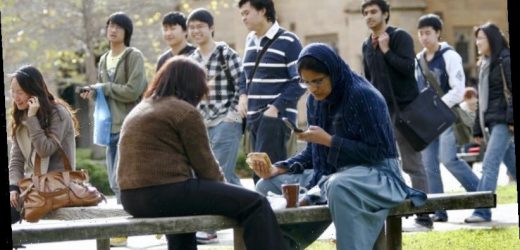Last year, the coronavirus pandemic challenged higher education, financially and existentially.
Australian universities have worked hard to carry out core duties of teaching and research but now as a new academic year begins, it is crucial to reflect on the impacts of social isolation on the student experience.
Universities face the challenges of keeping students socially engaged as coronavirus restrictions continue. Credit:Eddie Jim
While online learning allowed us to continue delivering academic content, the university experience is not limited to scholarly endeavours. A variety of social experiences is equally vital in developing well-rounded students.
The campus closures in Melbourne, while absolutely right and proper, have made it very difficult for students to feel connected to the academic community, and to foster a sense of belonging.
Physically distancing from each other calls for an enhanced sense of connection, empathy for and consideration of our students.
Disconnectedness was an oft-discussed concern even before the pandemic. We know that many students do not feel a sense of belonging. Research shows this is particularly challenging for graduate, part-time, mature aged and international students.
During the long, dark days of lockdown last year, we tried to keep a virtual community alive. We wanted students to feel a sense of university identity and pride as we supported their psychological and social wellbeing.
Now, when university campuses are still highly inaccessible to students and almost all their interaction with the university will take place online, even more importance must be placed on the mental health and wellbeing of students to ensure better learning outcomes.
New challenges to entering the labour market have disproportionately affected humanities students. The government’s recent job-ready package landed another blow to arts students whose sense of pride in their studies has taken a hit. They worry that their humanities degrees are not appreciated. These fears have been compounded by a sense of a disconnect between a university education and workplace expectations.
As academics, we can work harder to show students we are invested in them personally. This means keeping a meaningful connection and delivering rounded, challenging, and exciting online classes. In this unsettling time, gaining insights from learners’ perspectives about academic content, but also about their sense of (dis)connection, is crucial. We need to keep exploring how we can help students feel that they are part of a community, ask them what they are missing from online learning and address those issues.
Institutions could also consider abandoning some of the PR-approved mass emails to students, and be honest enough to acknowledge the uncertainty of student circumstances while describing the supports available. Listening to students and providing them with safe communication channels and targeted responses are crucial, too.
Students also have a role to play. They are young adults on the cusp of really going out into the world. They can choose to engage actively with whatever the university has on offer. Studies show that active participation enhances success rates of students during university, as well as employability prospects after graduation.
As the pandemic continues to transform the educational landscape, we now have a perfect opportunity to acknowledge that we need a more fluid and student-centred approach to learning.
Dr Nira Rahman and Dr Elizabeth Lakey are academics in arts teaching innovation at the University of Melbourne.
Start your day informed
Our Morning Edition newsletter is a curated guide to the most important and interesting stories, analysis and insights. Sign up here.
Most Viewed in National
From our partners
Source: Read Full Article



